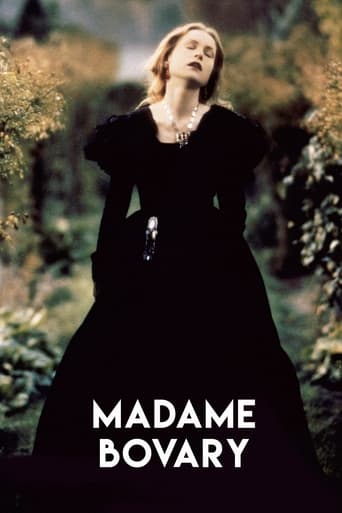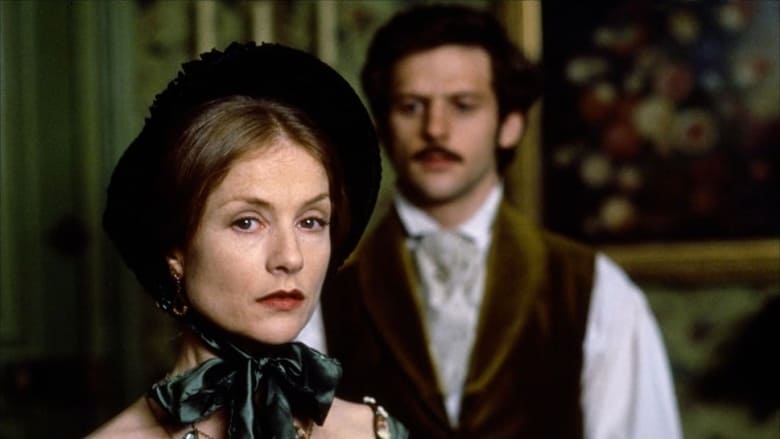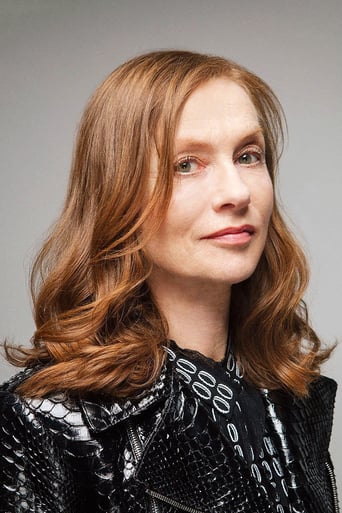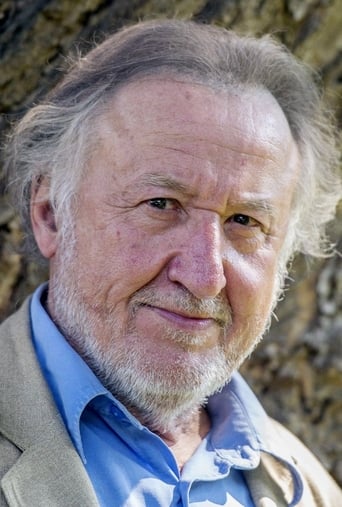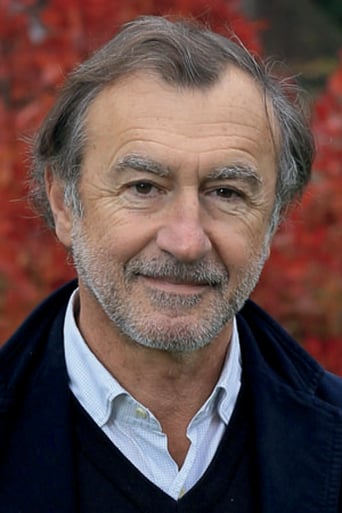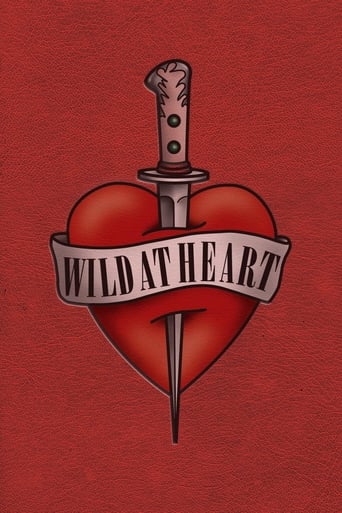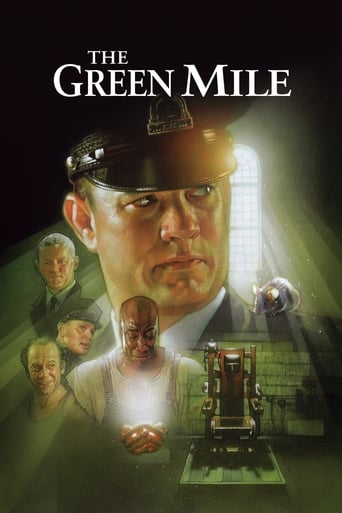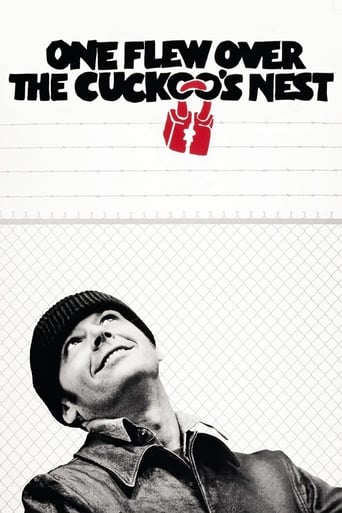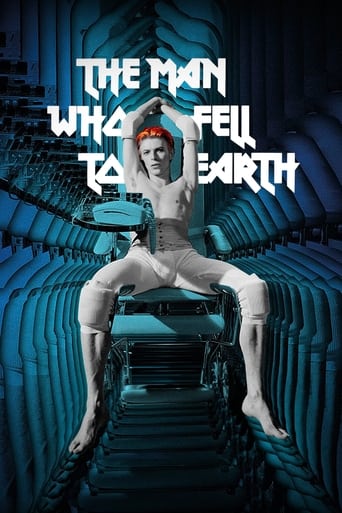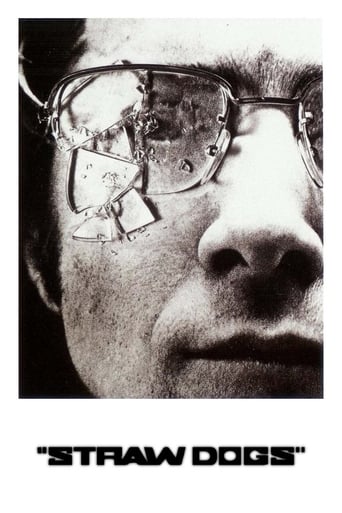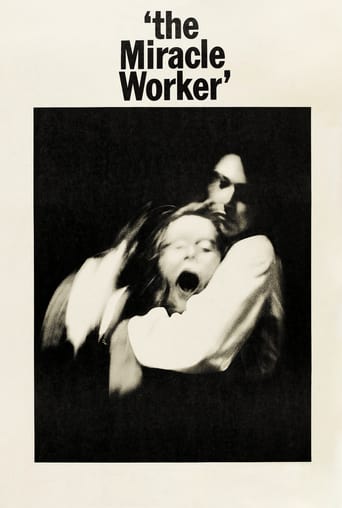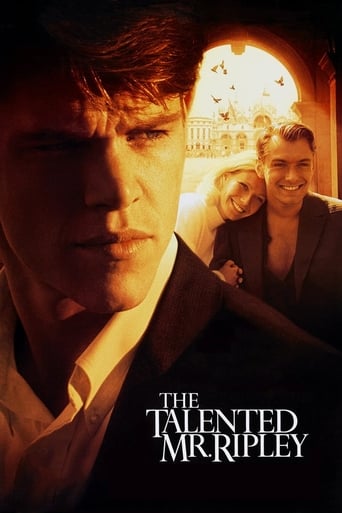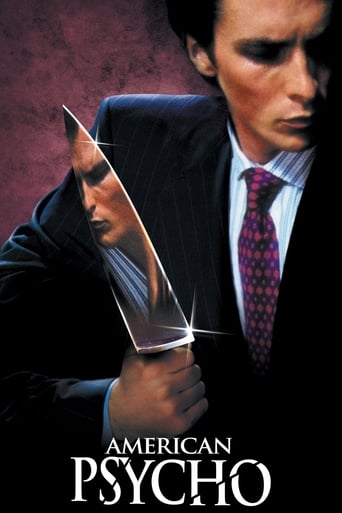Madame Bovary (1991)
Bored with the limited and tedious nature of provincial life in 19th-century France, the fierce and sensual Emma Bovary finds herself in calamitous debt and pursues scandalous sexual liaisons with absolute abandon. However, when her volatile lifestyle catches up to her, the lives of everyone around her are endangered.
Watch Trailer
Cast
Similar titles


Reviews
Let's be realistic.
Good movie, but best of all time? Hardly . . .
Not sure how, but this is easily one of the best movies all summer. Multiple levels of funny, never takes itself seriously, super colorful, and creative.
An old-fashioned movie made with new-fashioned finesse.
Seeing a note on ICM that a poll for the best films of 1991 would be coming soon,I decided to look at what the output of New Wave auteur Claude Chabrol was from that year. Finding the last viewing of Chabrol departing from the Thriller (Alice or the Last Escapade) to be a fascinating creation,I was interested in seeing him take on the Costume Drama, (note:I've not read the original novel) which led to me meeting Madame Bovary.View on the film:Making the most visible attempt to depart from his signature stylisation, writer/directing auteur Claude Chabrol reunites with cinematographer Jean Rabier to breath in the elegance of the Costume Drama,sparkling in panning shots over the regal clothes and crumbing buildings surrounding Bovary. Rubbing in the dirt that covers the lives of the characters in darkness, Chabrol boils up a dour atmosphere from charcoal blacks engulfing the screen. Not shying away from taking on Gustave Flaubert's "unfilmable" book, Chabrol's adaptation struggles from the weight of its origins, with chances appearing for a study of the rural lower class,being just lightly touched upon by Chabrol firmly sticking to the original text. Staying as faithful as possible to the novel, Chabrol sadly strips a layer of depth from the visual element of the movie by an over-use of narration,which interrupts the cast putting the thoughts and feelings of the characters across. Reuniting with Chabrol,Isabelle Huppert gives an exquisite performance which tugs at the heartstring and pulls at the ill roots of weakness from Madame Bovary.
Anybody taking on Gustave Flaubert's Madame Bovary should get some credit for the effort, the book is a classic and one of the greatest pieces of European literature(it's also easy to see why it was so controversial at the time) but it isn't an easy one to adapt at all with some very easy traps to fall into(making the characters one-dimensional for one). Of the three adaptations of the book seen so far personally- the others being the 2000 and 1949 versions-, this one is the most faithful but also the one that resonated with me least. There is much to like still, for one it looks absolutely gorgeous with very picturesque scenery, evocative settings, make-up and costuming and photography that is elegant and alive with colour. The music is hauntingly understated and lyrical, underlying the atmosphere while letting the drama speak. Claude Chabrol directs with a deft if at times clinical hand, particularly good in showing how rigid socially and morally mid-19th century French provincial life was. The performances are also great. Isabelle Huppert can understandably be seen as cold(to be honest Emma is the main reason why the book adaptation-wise is not that accessible because it is not easy to feel genuine sympathy for her), especially compared to Frances O'Connor and Jennifer Jones, and maybe she is not youthful enough in the early scenes but her classic beauty makes her perfect for period drama and she does act with coolness and poise but there is a sense of being stifled and being a victim of her own passions. Jean-Francois Balmer is appropriately mild-mannered and sympathetic if somewhat equally appropriately clueless as her husband. While Christophe Malavoy has the suavity and enigmatic menace just right and Lucas Belvaux is gentle without being dull. Jean Yanne shows Homais' unscrupulousness very well, and Jean-Louis Maury is good also as the malefic L'Heureux. Some things didn't come across as well. That it is faithful in detail to the book is laudable(most of the dialogue word for word), but it is one of those cases like the 1974 adaptation of The Great Gatsby of being too faithful that the dialogue while astonishingly literate and poetic lacks spark and emotion, the irony that surrounds Emma's tragic plight doesn't come across very well. The voice over doesn't really serve a point to the storytelling when it could have easily been said or shown, and that it is incorporated late and sparingly further gives it that notion. The story of the book is slow to begin with so it was not a bad thing for the adaptation to match the book's pacing. The thing is though the book's love scenes were passionate and there is also a lot of irony and bite. That the love scenes here were more coy than passionate(some of the chemistry looks uncomfortable), themes like the anti-clerical statements(quite savage ones at that) used in the book being excised and the writing having the poetry but not the irony made it not so easy to engage with and it all feels rather tame. The first half is often very ponderous and there is the sense that while the details are there what made the book so meaningful and shocking was lost. Overall, looks beautiful, skilfully directed and well-acted, but as a result of being too faithful emotionally and spirit-wise it felt cold and rather tame. The 2000 and 1949 also weren't as biting as the book, and they were nowhere near as faithful, but did have what this version didn't have. 6/10 Bethany Cox
It is a high valuation for this movie but I give it because of the novel of Gustave Flaubert. From now on I am talking about the novel and the parts which one can see in the movie or about their cross-points.The rise of the street business, cafeterias, agents, notary, private spaces and thoughts, secrets and frauds, modernization, science, fragmentary ethics and the fall of moral, religion, the ordinary, trivial, village life. If you want. The point from where Socrates and Voltaire felt their power of being free and their weakness of losing their goal. So, the fall of the fundamental and traditional. The question and now what? And the answer - where I am at this moment.In conclusion, if you do not want to read the book - then watch the movie.http://vihrenmitevmovies.blogspot.com/
Madame Bovary is one of those period pieces one can only really describe as "competant" when one is offering their most glowing of assessments, a film with a sense of the grandiose and extravagant but somehow managing to feel restrained and stiff; a film with the feeling that there is something inherently important at the centre of it all, without there actually being anything too drastic to actually get wound up about. The piece, somewhat needlessly narrated throughout, is a sturdy but patchy French period drama; a film about reasonably unlikeable characters in a time rich in both extravagance and high-culture dressing profligately and feeling sorry for themselves; unlikeable characters having affairs and rather a bit of sex on top of living rich, dainty lives. Few of the performers in the film seem all that interested, and the film is stiltedly directed; one character worth their weight is that of an aide to a predominantly featured doctor – a bubbly, enthusiastic presence and the only individual with a bit of life about them. The rest of it, a piece made by that of Claude Chabrol and adapted from a certain Gustave Flaubert novel, just about lives up to its historical eminence and the weighty directorial name who's behind it, in what is an engaging enough, although-often-unsure-of-itself drama with pretensions to be a mental health awareness piece generally uneasily gluing together.The film follows Isabelle Huppert's Emma, a young French girl initially living alone in the 19th Century with her father on his farm and under some rather basic conditions. Through a great deal of physical pain and bother that one man must suffer through comes the catalyst which eventually leads to further great amounts of pain and bother - this time of a psychological sort and shouldering itself with a woman. The man in initial pain is Emma's father, who badly injures himself whilst drunk and is forced into being bed-ridden on account of a broken leg as a very specific doctor comes to visit and offer assessment. We sense Emma is frustrated at living with such a man, her father; his lying there on the bed as the doctor, Charles Bovary (Balmer), tends to him we sense is the father at the most static he has been in quite a while. Emma appears interested in Bovary, their exchange of glances and the manner in which she sucks a wound derived from sewing is highly suggestive of a desire, at least on her behalf, of perhaps furthering something.In spite of his careful and highly astute nature in both his demeanour and profession, something which clashes with her farm-hand lifestyle and alluded-to rebellious streak of times gone by when she once toyed with the realities of her health at a convent, they hook up. As the title would suggest, something does indeed spawn out of this chance encounter; Emma becoming the titular Madame Bovary in marrying Charles, himself a widower and easy-going guy, before moving in with him and his practise in a far-off town. What transpires from here appears to be a film trying to tackle the nihilist realities of life; a drama covering the exploits of a woman whom disliked the nature of what her life was from the stage of being a juvenile to that of a young adult before reaching the conclusion that her life, or polarised existence, is just as crummy in amidst the operas; grand balls and social interaction with 19th Century northern France's elite.There just isn't pleasing some people - or is there? The film alludes to the lead suffering from some sort of illness; some sort of depression, perhaps born with it – perhaps not, perhaps always destined to be unhappy at whatever her surroundings generally consisted of and with whom she lived. Boredom gives way to lust within the echelons of Emma's head, the dancing with an anonymous younger man at one of those fancy private functions, after it's established she is unamused by the nature of the thing, sees her immediately pick up hinting to an unabashed desire to perhaps step out of her marital bubble. Such a characteristic becomes more inherently real when the Bovary's up-camp and move to another town-plus-practise so that Charles may expand his repertoire.With their marriage already on the rocks, Emma meets a cocksure landowner named Rodolphe (Malavoy); a character confirming earlier ponderings on whether Emma would step out of wedlock to sleep with another man. It would appear the two of them enjoy a passionate enough relationship, but a scene in a grassy field underneath a tree in which Rodolphe verbally establishes his desire to tame her sexual lustings he's pretty sure she possess ought to be though processes or minor exchanges established visually, and with some sort of urgent flare rather than have a static character reiterate what his, or her, thoughts are. In spite of veering nearer a pretence that it is to explore the diminishing mental well-being of a woman as well as her ill-advised desires to explore sexual awakenings, the film actually shies away from any brash, confrontative content of that nature; as if willing to mention such adult subject matter but too timid to go the distance and properly depict the character slip away and into this newfound lifestyle (brought about by whatever) of smut and sleaze in a fashion that a film like Polanski's 1992 film Bitter Moon did not fall foul of. Madame Bovary is not a total loss - there are fair degrees of drama and peril to be had out of certain scenes but her tragic, seemingly restrained, inhibition to share her problems or issues with her fellow characters arrives in sync with the film's evident annoyances not to not head down a specific route and depict a woman in a stone-wall state. It is prim and proper whilst professionally put together, but it lacks a cutting dynamic which tells us that we should be caring more than we are.
